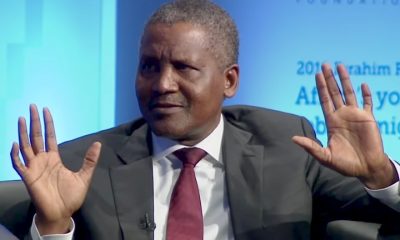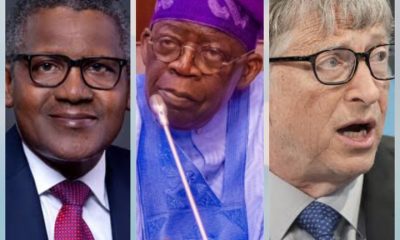Headline
Dangote Becomes $20m Wealthier, Maintains Spot As Africa’s Richest Man

Aliko Dangote, the president of Dangote Group, has added $20.7 million to his wealth as at June 30, 2023, through investments in the industrial sector — cementing his spot as Africa’s richest man.
TheCable had reported that Dangote lost $3.12 billion following Nigeria’s decision to float the local currency and unify its exchange rate system.
According to the latest Bloomberg Billionaires Index, the business mogul remains the richest man in Africa, despite the volatility of the Nigerian naira against the dollar.
In the billionaire listing released on Friday, Dangote, with a wealth of $15.6 billion, topped other Africans on the index.
This means Dangote’s wealth increased by 4 percent compared to his net worth valued at almost $15 billion in 2020, when he moved from 103rd position on the billionaire index to 63.
Hailing from Nigeria’s northern region, the serial investor has been the richest man in Africa for the 12th year running.
According to the index, Dangote is currently the 111th person and the only Nigerian on the list of the top 500 billionaires.
In May 2023, the billionaire inaugurated the Dangote petroleum refinery, an illustrious project expected to catalyse the transformation of Nigeria’s energy sector.
The inauguration came a decade after he announced plans for the refinery in September 2013, when he secured about $3.3 billion in financing for the project.
He also controls sub-Saharan Africa’s biggest cement producer, Dangote Cement, with interests in sugar, salt, fertiliser, and packaged foods.
Alongside Dangote, other Africans listed in the latest top 500 world billionaires index for the year 2023 include; Johann Rupert and family (South Africa, $13.3 billion), Nicky Oppenheimer (South Africa, $9.0 billion), Nassef Sawiris (Egypt, $7.47 billion), Natie Kirsh (South Africa, $7.37billion) and Naguib Sawiris (Egypt, $5.93 billion).
Headline
Fagbemi warns against obstructing EFCC from performing its lawful duty

The Minister of Justice, Lateef Fagbemi, SAN has warned against obstructing the Economic and Financial Crimes Commission (EFCC) from carrying out its lawful duty .
Fagbemi’s warning is contained in a statement in Abuja.
“This is a matter of very grave concern, it is now beyond doubt that the EFCC is given power by the law to invite any person of interest to interact with them in the course of their investigations into any matter, regardless of status.
“Therefore, the least that we can all do when invited, is not to put any obstruction in the way of EFCC, but to honourably answer their invitation.
“A situation where public officials who are themselves subject of protection by law enforcement agents will set up a stratagem of obstruction to the civil and commendable efforts of the EFCC to perform its duty is to say the least, insufferably disquieting’’.
He added that running away from the law will not resolve issues at stake but only exacerbate them.
“Nigeria has a vibrant judicial system that is capable of protecting everyone who follows the rule of law in seeking protection.
“I therefore encourage anyone who has been invited by the EFCC or any other agency to immediately toe the path of decency and civility by honouring such invitation instead of embarking on a temporising self-help and escapism.
“This can only put our country in bad light before the rest of the world’’.
He said institutions of state should be allowed to function effectively and efficiently.
“I stand for the rule of law and will promptly call EFCC, and indeed any other agency to order when there is an indication of any transgressions of the fundamental rights of any Nigerian by any of the agencies’’.
NAN reports that the EFCC had on Wednesday warned members of the public that it was a criminal offence to obstruct officers of the Commission from carrying out their lawful duties.
Section 38(2)(a(b) of the EFCC Establishment Act makes it an offence to prevent officers of the Commission from carrying out their lawful duties. Culprits risk a jail term of not less than five years.
The warning , the EFCC said, became necessary against the background of the increasing tendency by persons and groups under investigation by the Commission to take the laws into their hands by recruiting thugs to obstruct lawful operations of the EFCC.
On several occasions, the anti graft agency said, operatives of the Commission have had to exercise utmost restraint in the face of such provocation to avoid a breakdown of law and order.
Headline
Unknown Gunmen Abduct Channelstv Reporter In Port-harcourt

Some unknown gunmen have kidnapped Joshua Rogers, the ChannelsTV reporter in Port-Harcourt, the Rivers State capital.
Politics Nigeria learnt that Rogers was picked up close to his residence at Rumuosi in Port Harcourt and to an unknown destination by the gunmen around 9pm on Thursday, April 11.
The reporter was driving his official ChannelsTV branded car when the hoodlums accosted, pointed a gun at him and took him away in the same vehicle.
Rogers was said to be returning from his official assignment in Government House after a trip to Andoni for a government event when the incident happened.
Already, the gunmen were said to have contacted his wife and demanded a N30million ransom for bis release.
His cameraman confirmed the incident and appealed to his abductors to set him free unconditionally.


















